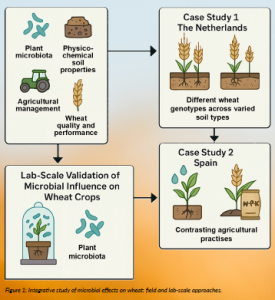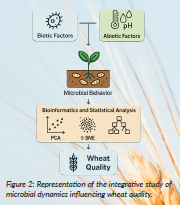Sonata Adomavičiūtė-Grabusovė1, Rita Vilaça2, Susana Soares2, Rosa Perez-Gregorio2,3,4
1UAB “Beta Via”, Lithuania
2LAQV-REQUIMTE, Department of Chemistry and Biochemistry, Faculty of Sciences, University of Porto
3Institute for Agroecology and Food (IAA), Universidade de Vigo – Campus Auga, Food and Health Omics
4Galicia Sur Health Research Institute (IIS Galicia Sur), SERGAS-UVIGO (Spain)
Wheat is a fundamental component of the global food supply, with millions of people relying on it for their daily nutrition. Any disruptions in wheat production—such as poor yields or reduced quality—can have significant effects on food availability and prices. Therefore, improving wheat performance and ensuring its sustainability is essential for a sufficient and stable food supply.
Achieving optimal wheat crop performance is often hindered by various biotic and abiotic factors that affect soil health, plant microbiomes, wheat quality and overall productivity. To address these challenges, it is essential to strengthen food security, economic resilience and environmental sustainability—all while equipping farmers with the tools and knowledge they need to navigate shifting edaphoclimatic agricultural conditions.
The EU-funded WHEATBIOME project addresses these challenges through comprehensive research on wheat development—from soil conditions to crop quality, food impact, and health—with the goal of enhancing the production of healthy food and feed. This effort is vital to create a more stable and nutritious food system for future generations.
Optimising wheat quality and productivity through integrated agricultural and microbial studies across Europe
The WHEATBIOME project addresses the complex nature of wheat nutritional values and yields by investigating the intricate interactions between wheat genotypes, soil types, farming practices and environmental conditions at an agricultural level. The project aims to develop predictive models for sustainable wheat cultivation to optimise farming practices and improve crop outcomes, enhancing grain nutritional value while promoting environmental stewardship.
To better understand the key determinants of wheat quality and productivity, the study in the WHEATBIOME initiative focuses on analysing the correlation between agricultural practices (ecological vs conventional and irrigation vs non-irrigation conditions), edaphoclimatic conditions (six geographical locations in two different regions and different soil types), cultivars (five varieties) and their associated microbiomes. By integrating multi-variable and multi-regional data, we aim to identify the primary factors influencing wheat crops across different European regions. In our study, we propose an approach that enables the development of statistical models tailored to specific wheat nutritional and safety quality criteria, such as protein content, immunogenic proteins, total phenolics and total polysaccharides. Ultimately, the integration of multiple wheat physicochemical attributes will enhance our understanding of the potential of specific cultivars, agricultural practices or soils in delivering high-quality wheat crops. We will share the correlations we derive from this analysis with a decision support system (DSS) to optimise crop management strategies and guide further research. Additionally, selected wheat samples based on their superior attributes— such as higher bioactive compounds or lower immunogenic proteins—will be used for subsequent studies related to fermentation processes in food and feed production systems.
Harnessing microbial insights: sustainable outcomes and impact of the WHEATBIOME initiative
This comprehensive approach we develop in WHEATBIOME projects aims to:
- identify how microbial communities are affected by wheat genotype, edaphoclimatic conditions, and agricultural practices and collectively influence wheat metabolism and protein expression to a more nutritious and safe wheat
- determine the key factors that enhance wheat quality attributes, providing actionable insights for optimising crop management
- enable informed decisions through an integrated DSS, facilitating improvements in wheat yield and nutritional value, which can be used as a translational research in additional crops.
The microbiota’s impact on wheat quality
The microbiome encompasses the diverse community of microorganisms—bacteria, fungi and other microbes—that inhabit the soil and interact with plant roots. In the case of wheat, the rhizosphere microbiome plays an important role in nutrient cycling, disease suppression and overall plant vigour. However, little is known regarding the overall influence on plant metabolism and the resulting nutritional quality and expression of immunogenic proteins.
Certain rhizosphere bacteria fix atmospheric nitrogen, making it accessible to wheat plants, while others decompose organic matter to release key nutrients such as phosphorus and potassium. Additionally, some microbes secrete bioactive compounds or can stimulate the secondary metabolism to be expressed that shield roots from pathogens, thereby enhancing the plant’s natural defences.
A range of factors, including soil type, agricultural practices and environmental conditions, shape the composition and functionality of this microbiome. Practices such as tillage, irrigation and the use of chemical inputs can significantly alter microbial community structure and activity. Furthermore, shifts in climate—such as changes in temperature or precipitation patterns— can disrupt the balance of microbial populations in the wheat root zone.
Research proposed in the WHEATBIOME project advances our understanding of the wheat rhizosphere microbiome and is essential for promoting sustainable agriculture. Agricultural interventions that shape microbial communities—such as reduced tillage, organic amendments or targeted microbial inoculants—can, therefore, be key tools for enhancing wheat quality and sustainability. By managing the microbiome, farmers can shift away from yield-only goals toward optimising end-use characteristics such as nutritional value, processing performance and shelf life.
Biotic and abiotic factors influencing microbial communities
Microbial communities in soil are highly sensitive to both biotic and abiotic factors. Biotic factors encompass living elements such as microorganisms, fungi and bacteria, which can influence microbial activity through competition for resources or mutualistic interactions. For example, wheat roots excrete organic compounds (root exudates) that attract beneficial microbes like nitrogen-fixing bacteria or mycorrhizal fungi, fostering symbiotic relationships that enhance nutrient uptake and plant growth.
On the other hand, abiotic factors such as temperature, soil pH, moisture levels and nutrient availability significantly shape microbial diversity and function. For instance, extreme temperatures can alter microbial metabolic rates, while changes in soil pH can favour certain microbial groups over others. These shifts in microbial composition can directly impact wheat crops by influencing processes like nitrogen cycling, disease suppression and stress tolerance.
Understanding wheat and soil: a path to better crops
Producing high-quality wheat under increasingly variable environmental conditions requires a deeper understanding of the complex interactions between plant microbiota, physico-chemical soil properties, agricultural management, wheat quality and performance. Two field-scale case studies explore these factors to help us understand how to improve crop performance.
Case study 1 – The Netherlands
Researchers explore how different wheat genotypes perform across varied soil types, which affects the microbial communities. By testing multiple wheat varieties in distinct edaphoclimatic conditions, the study reveals how soil-microbe-wheat interactions influence plant health, productivity and grain quality. The aim is to identify optimal genotype-soil pairings that support both high-yield and desirable wheat traits.
Case study 2 – Spain
This study focuses on how contrasting agricultural practices—including irrigation regimes and the use of conventional versus organic inputs— affect microbial communities and, in turn, wheat quality. Keeping the wheat genotype constant, researchers are able to isolate the effect of management strategies on the soil microbiome and its downstream influence on crop resilience and nutritional value.
Lab-scale validation of microbial influence on wheat crops
To explore how microbial consortia contribute to wheat nutrition and performance, researchers carry out a controlled laboratory study to examine their direct effects. They simulate field-relevant conditions to isolate the impact of microbes on plant development and grain composition. Wheat plants are inoculated with selected microbial consortia and cultivated under standardised conditions, alongside untreated controls. Upon reaching maturity, both soil and plant samples are analysed using comprehensive techniques, including assessments of soil composition, plant nutritional profiles, microbiome structure, proteomics and metabolomics.
Comparative analysis aims to reveal how microbial treatments influence key traits in wheat, such as amino acid balance, nutrient uptake and protein expression. This study also seeks to validate the role of core microbiome taxa that are linked to improved crop quality.
Why it matters: by dissecting how wheat interacts with its biological and physical environment, these studies contribute actionable insights for designing resilient, sustainable and high-performing cropping systems. Understanding the complex effects of wheat genotype, soil, microbiota, climate and agricultural practice enables farmers to tailor strategies for improving grain quality while maintaining sustainability.
Bioinformatics and statistical approaches for sustaining microbial dynamics
The relevance of bioinformatics and statistical tools lies in their ability to enhance our understanding of the intricate relationships between biotic and abiotic factors influencing microbial behaviour in food systems. By applying multifactorial methods, researchers can correlate diverse variables to uncover patterns and predict outcomes that might otherwise remain hidden (Figure 2). Bioinformatics integrates datasets from metagenomics, metabolomics, proteomics and environmental data to identify microbial indicators associated with traits such as nutritional quality, resilience to stressors and potential health risks. These findings enable the creation of predictive models that support decision-making across the food supply chain. From early cultivation practices to post-harvest processing and food safety monitoring, these models have a wide range of practical uses in ensuring food quality and safety.
The application of these integrative analytical approaches supports a systems-level understanding of sustainability that spans the entire agri-food chain—from farm to fork. This not only enhances scientific impact but also empowers farmers with actionable knowledge to design resilient, efficient and health-conscious food production strategies.
Societal impact: advancing wheat quality through microbiome science
The WHEATBIOME project delivers transformative value to agriculture and society by unlocking the potential of microbiome-informed wheat production across Europe. Through a series of coordinated, multi-regional case studies, cutting-edge analytical tools and lab-scale validations, this study drives innovations that ensure a broad impact.
- Statistical modelling of wheat quality traits will identify optimal combinations of cultivars, soils and agricultural practices.
- The selection and validation of beneficial microbial consortia can reduce chemical inputs while improving crop resilience and nutritional value.
- Wheat samples identified for their superior attributes will contribute to fermentation research, supporting advances in food and animal feed quality.
- A digital DSS, integrating soil, climate, microbiome and crop performance data, will offer real-time, personalised guidance to wheat producers.
- The project enhances the stability and quality of wheat production by aligning microbial science with practical cultivation strategies.
Project summary
The WHEATBIOME project gathers 13 partners from academia, industry, food systems and governmental bodies aiming to explore how biotic/abiotic factors impact soil and wheat microbial communities. The project will contribute to the development of novel and healthier food and feed products while enhancing sustainable farming practices for resilient crops and societal perception about microbiomes within food systems.
Project partners
WHEATBIOME consortium includes experts in the human microbiome (LAQV/ REQUIMTE, PT), agro-edaphic microbiomes (UPORTO, PT), plant biochemistry (WUR, NL), microbial biotechnology (UVEG, ES), nutrition (UVIGO, ES), food technology (IBPRS, PL), food production (ISANATUR, ES), sustainability assessment (CTA, ES), animal health (SGGW, PL), food/feed legislation (UVMB, HU), clinical trials (NMS, PT), computer science (BETAVIA, LT), communication/dissemination (CTA, ES), and education/training (EDAGRI, ES).
Project lead profile
LAQV/REQUIMTE is a research institute with a core mission to promote scientific and technological activities aligned with the United Nations sustainable development agenda and to provide smart and sustainable solutions to governments, industry and society. With a robust organisational structure, LAQV/REQUIMTE gathers top-notch technical resources coordinated by qualified staff, enhancing the institution’s renowned scientific excellence.
Project contacts
Susana Soares and Rosa Pérez-Gregorio
(Project Coordinators)
Email: wheatbiome@requimte.pt
Web: www.wheatbiome-project.com
X: @wheatbiome
Linkedin: /company/wheatbiome-project
Funding disclaimer
This project has been funded by European Union’s Horizon Europe research and innovation programme -grant agreement number 101084344.
Views and opinions expressed are however those of the author(s) only and do not necessarily reflect those of the European Union. Neither the European Union nor the granting authority can be held responsible for them.
Figure legends
Figure 1: Integrative study of microbial effects on wheat: field and lab-scale approaches.
Figure 2: Representation of the integrative study of microbial dynamics influencing wheat quality.



